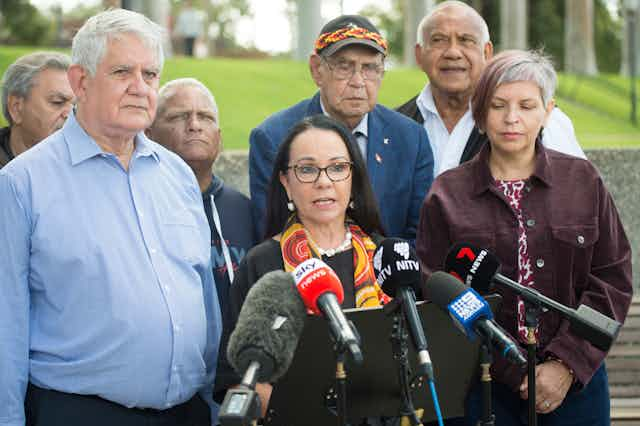Support for the Indigenous Voice to Parliament has dropped since the first polls that asked about it in late 2022. Analyst Kevin Bonham has plotted all the poll results, and the average Voice support is down from 65% in August 2022 to 57% now.
Last week’s Morgan (a “yes” lead of just 54-46) was particularly concerning for Voice supporters, given the history of support for referendum proposals collapsing as the referendum draws near.
The Sydney Morning Herald reported Sunday that a YouGov poll of over 15,000 respondents, for the group behind the Uluru Statement from the Heart, had “yes” to the Voice leading nationally by 51-34, and in every state and territory, with Queensland the closest at 47-40 “yes”.
However, this poll was conducted March 1-21, so it is well over a month out of date.
To win a constitutional referendum in Australia, a majority of the states as well as an overall majority must vote “yes”. This means at least four of the six states need to vote “yes”.
History of past referendums
Only eight of 44 proposed referendums have succeeded. There have been five instances where “yes” has won nationally, but failed to win a majority of states.
I have investigated whether referendum proposals were attempted by Labor or conservative governments, and whether those held concurrently with a general election were more successful. Referendum results and dates are here, governments formed after each election here and House of Representatives election dates are here.
The first nine years after federation in 1901 were before the development of the two party system, and Labor was part of a government led by the Protectionists that passed the 1906 referendum. Since then, only one of 25 referendums proposed by Labor governments have succeeded.
Conservative governments have had more success with six of 18 referendums proposed by non-Labor governments succeeding. Analyst Peter Brent wrote in Inside Story that conservative oppositions nearly always oppose Labor referendum proposals, while Labor oppositions sometimes support conservative government proposals.
While not doing well enough to pass when held with a general election, Labor government proposals have performed better when held with an election than at midterm referendums. The four 1988 midterm referendums all failed with between 31% and 38% support nationally, while the four that were held with the 1974 election had 47% to 48% support.
Brent says that elections are about who will form the next government, and referendums held with elections benefit from not being the focus of attention. But midterm referendums are the focus, and can become like a byelection, at which governments usually do badly.
Early polling for referedums is not predictive. Brent said the 1988 referendums were polling in the 60s and 70s in May 1988, before crashing into the 30s at the September referendum date.
The record “yes” vote of 90.8% at the 1967 referendum is not a guide to the result of the Voice referendum, as this earlier referendum was proposed by the Coalition and supported by Labor. Brent also thinks this referendum benefited from being the second question asked in 1967; the first was heavily defeated.
Read more: ‘Right wrongs, write Yes’: what was the 1967 referendum all about?
In 2017, the plebiscite that allowed same-sex couples to marry was passed with 61.6% support (this was not a referendum as it did not require a change to the constitution to implement).
This plebiscite was initiated by the Coalition with Labor support, and the large majority of voters would have known someone who was homosexual, and were therefore inclined to be sympathetic to same-sex marriage. By contrast, most Australians do not have regular contact with Indigenous people.
If the Voice is to defy the history of Labor-initiated referendums that were opposed by the Coalition, particularly at midterm referendums, the Albanese government will need to continue to poll at honeymoon levels until the referendum date. Labor’s history-making win at the federal Aston byelection gives the Voice some chance of passing, but history suggests it will be a struggle.
UK local elections and the US debt limit
I wrote for The Poll Bludger last Thursday that UK local elections will be held this Thursday. Labour has a large poll lead, but it is being reduced.
Last Thursday AEST, Republicans passed a bill that would raise the US debt limit in return for spending cuts that are strongly opposed by Democrats through the House of Representatives. The US is headed for a crisis over the debt limit later this year. Donald Trump’s lead in national Republican primary polls continues to widen. Polls for the May 14 Turkish elections were also covered.
Victorian Resolve poll: Labor still way ahead
A Victorian state Resolve poll for The Age, conducted with the federal March and April Resolve polls from a sample of 1,600, gave Labor 42% of the primary vote (up one since February), the Coalition 30% (steady), the Greens 10% (down three), independents 12% (down one) and others 5% (up one).
Resolve does not provide two party estimates until close to elections, but Labor is clearly still far ahead. This poll was taken before the corruption watchdog’s report that criticised the Labor government. Incumbent Daniel Andrews led the Liberals’ John Pesutto by 49-28 as preferred premier (50-26 in February).
Liberal MP Moira Deeming attended an anti-trans rights rally that was gatecrashed by neo-Nazis. Pesutto tried to expel her, but was forced to settle for suspending her for nine months.
The poll article says that 23% wanted Deeming expelled, but 20% said she deserved less punishment than her suspension. “About one-third” were unsure or indifferent as to her punishment, leaving 24% who presumably supported the nine-month suspension.

